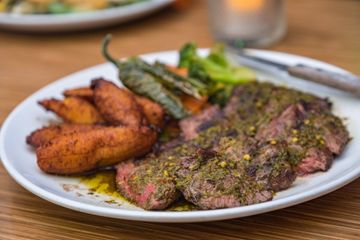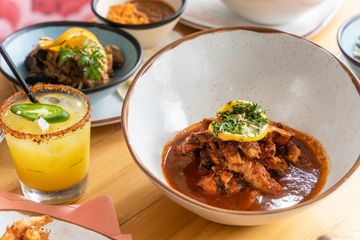End your meal with freshly fried churros dipped in sugar glaze sauce
Wiki Article
Is Mexican Food Healthy? Unboxing the Nutritional Benefits of Traditional Components
The inquiry of whether Mexican food is healthy welcomes an exploration of its standard components. Beans and corn act as foundational staples, rich in protein and fiber. Avocados supply helpful fats, while various natural herbs and spices include taste and health and wellness benefits - best mexican westchester NY. Together, these parts produce a tapestry of nutrition. The healthfulness of Mexican cuisine usually depends on prep work techniques and part sizes. What duty do these elements play in establishing its total dietary worth?The Power of Beans: Protein and Fiber-Rich Staples
Although often ignored, beans work as a keystone of Mexican food, offering a wide range of dietary benefits. Rich in healthy protein, they are a superb plant-based choice for those looking for to fulfill their dietary healthy protein needs. This high healthy protein material supports muscular tissue repair and growth, making beans invaluable for both meat-eaters and vegetarians alike. Furthermore, beans are an exceptional source of dietary fiber, which assists in food digestion and promotes a sensation of fullness, potentially aiding with weight monitoring.The selection of beans used in Mexican dishes, such as black beans, pinto beans, and kidney beans, adds to a varied flavor profile and can enhance meals nutritionally. Beans are low in fat and consist of crucial vitamins and minerals, including iron, folate, and magnesium. Together, these attributes make beans an important ingredient, providing both nourishment and nutrition in traditional Mexican price.

Corn: a Versatile Grain With Nutritional Perks
Corn stands out as a flexible grain fundamental to Mexican cuisine, commemorated not just for its culinary applications but likewise for its impressive dietary profile. As a main component in dishes like tortillas, tamales, and pozole, corn gives essential nutrients that add to a well balanced diet regimen. Rich in carbohydrates, it serves as a significant energy resource, while also being reduced in fat, making it a favorable option for different nutritional demands.Corn is a good resource of nutritional fiber, which aids in food digestion and advertises satiation. It contains considerable amounts of vitamins such as B-complex vitamins, which are crucial for power metabolism. The existence of antioxidants, especially carotenoids, adds to general health by lowering oxidative stress. Additionally, corn is gluten-free, providing to those with gluten sensitivities. On the whole, the dietary advantages of corn underscore its relevance in typical Mexican food and its role in a healthy and balanced diet plan.
Avocados: Healthy And Balanced Fats and Nutrients in Every Bite
Avocados play a significant duty in Mexican cuisine, complementing recipes with their creamy structure and abundant flavor. Past their cooking allure, avocados are celebrated for their impressive dietary account. They are a rich source of healthy monounsaturated fats, which can help lower bad cholesterol levels and support heart wellness. In addition, avocados are loaded with important vitamins and minerals, consisting of potassium, vitamin E, and B vitamins, adding to overall health.The high fiber content in avocados help digestion and promotes satiety, making them a beneficial addition to any kind of meal. Their distinct nutrient make-up can additionally sustain skin wellness and offer anti-inflammatory benefits. Incorporating avocados into traditional Mexican recipes or appreciating them as a standalone snack can enhance both flavor and nourishment, showing why they are a cherished staple in Mexican food. On the whole, avocados supply a tasty means to delight in healthy and balanced fats and vital nutrients in every bite.

Natural Herbs and spices: Flavorful Health Boosters
While appreciating the rich flavors of Mexican food, one can not ignore the crucial duty that spices and herbs play in improving both taste and health and wellness. Components such as cilantro, chili, and oregano peppers not only add to the vibrant taste account but also give significant wellness benefits. For instance, cilantro is understood for its detoxing properties, helping to get rid of hefty metals from the body, while oregano is packed with anti-oxidants and has anti-inflammatory effects.Chili peppers, a staple in lots of Bonuses Mexican meals, consist of capsaicin, which has actually been linked to boosted metabolic process and pain relief. Furthermore, flavors like cumin and coriander assistance food digestion and may assist in blood sugar level policy. Integrating these tasty wellness boosters right into dishes not just enhances the culinary experience yet likewise promotes general well-being, making Mexican food not just scrumptious, but his explanation also nutritionally advantageous.
Typical Cooking Techniques: Enhancing Nutrition and Taste
Standard cooking techniques in Mexican cuisine play a vital role in boosting both nutrition and taste, as they often focus on time-honored methods and fresh components. Techniques such as nixtamalization, where corn is saturated and prepared in an alkaline remedy, not only improve the nutrient profile of tortillas however also improve their digestibility - mexican food. Additionally, using sluggish food preparation approaches, like cooking or braising, enables tastes to blend magnificently while maintaining the integrity of the components
Regularly Asked Inquiries
Are Mexican Food Portions Normally Larger Than Other Cuisines?
Mexican food portions are often bigger than those of several other cuisines. This particular mirrors conventional eating methods, highlighting communal sharing and hearty meals, which can result in an extra substantial offering dimension on the whole.
Exactly how Does the Preparation Method Affect Healthiness of Mexican Food?
Preparation approaches substantially affect the healthfulness of Mexican food. Strategies such as grilling or steaming protect nutrients, while frying can raise undesirable fat web content. Selections of active ingredients and cooking styles eventually establish total dietary worth.Can Mexican Food Be Customized for Details Dietary Constraints?
Mexican food can undoubtedly be customized for particular nutritional constraints. Alternatives, such as making use of corn tortillas for gluten-free diet plans or including even more vegetables, allow individuals to appreciate conventional flavors while fitting different dietary requirements.What Prevail Mistaken Beliefs Regarding Mexican Food and Wellness?
Common false impressions about Mexican food consist of the idea that it is inherently harmful, overly zesty, and solely concentrated on fats. In truth, traditional dishes typically include healthy active ingredients and can be customized to numerous dietary demands.Are There Healthier Alternatives at Mexican Dining Establishments?
Much healthier choices at Mexican restaurants often consist of barbequed meats, beans, and fresh vegetables. Choosing dishes that stress whole components and avoiding heavy sauces can cause a more healthy eating experience, promoting overall health.The selection of beans used in Mexican dishes, such as black beans, pinto beans, and kidney beans, adds to a varied flavor account and can enhance dishes nutritionally. Avocados play a considerable function in Mexican food, matching dishes with their creamy appearance and rich flavor. Including avocados right into typical Mexican recipes or enjoying them as a standalone treat can boost both taste and nourishment, demonstrating why they are a cherished staple in Mexican cuisine. While appreciating the rich tastes of Mexican food, one can not forget the vital function that spices and natural herbs play in he has a good point boosting both preference and health and wellness. Conventional food preparation methods in Mexican food play an important function in improving both nourishment and taste, as they usually focus on time-honored techniques and fresh ingredients.
Report this wiki page